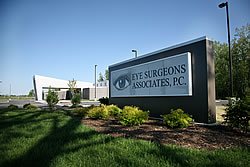Be vigilant about lazy eye.
“Approximately four of every 100 preschool children demonstrate amblyopia or lazy eye which leads to loss of vision in otherwise healthy eyes,” explains Dr. Frederick, Pediatric Ophthalmologist. The vision loss is permanent unless identified and treated early in life. “This is why it’s so important for children to receive an eye exam by age three,” he adds. Pediatric ophthalmologists like Dr. Frederick can perform a complete eye exam on children of any age.
Detecting and treating lazy eye.
The most frequent cause of amblyopia is eye muscle imbalance. If the eyes point in different directions, the brain prefers the image from the straight eye and ignores the image from the turned eye. If this condition persists, the deviating eye’s image may be lost permanently. Simple screening tests reveal the child’s fixation preference and a more detailed medical eye exam will identify the cause.
Amblyopia may also occur as a result of one eye being more nearsighted, farsighted, or astigmatic than the other. The pediatric eye exam will separate those children who need glasses from those with a blocked visual pathway (the third largest category of childhood amblyopia) such as due to infant cataracts or droopy eyelids. The exam will also rule out other serious causes of visual loss such as prenatal infection or birth defects involving structures inside the eye.
When Eye Surgeons’ patient Rylie was six years old, she complained she couldn’t see the board at school. Her mom, Megan, had Rylie’s eyes examined when she was one year old and was doing everything right as a parent. When Rylie’s reading level started to fall behind her classmates, Megan knew it was time to make an appointment.
The exam revealed Rylie had lazy eye and astigmatism, which is the more difficult condition to detect in the exam. Dr. Frederick recommended patching the “good” eye right away to encourage the use of the “bad” eye. Patching therapy typically lasts for weeks or months and sometimes continues over a period of years, as was the case with Rylie.
For Rylie, she’s been going for an exam every three months for three years and her glasses prescription has changed frequently as her eyes adjust. While she doesn’t think it’s fair to have an eye condition, she has enjoyed picking out new glasses frames to reflect her favorite colors.
Rylie’s mom says they are nearing the end of the patching treatment option even though Rylie hasn’t had a full correction of the amblyopia. Treating children early is key to successful treatment. Like many, Rylie will need to wear glasses or contacts for vision correction.
Words of wisdom.
Rylie’s mom has some words of advice for other parents. “All of my children receive an exam at age one. Watch for warning signs like a child having a decreased desire to read out loud. Listen to your child’s teacher. They are often the first to notice changes in the classroom that may be caused by vision problems.”
She continues, “Also be aware of changes in personality. Rylie’s confidence has declined and she became shyer because of her reading skill. She went to a summer reading program and after school reading program to get caught back up. She enjoys reading again, but doesn’t like to read as much as she did at a younger age.”
Rylie likes to play with the toys at the Bettendorf Eye Surgeons office and said, “Dr. Frederick is very nice and good. I have fun when I see him.”
It is recommended that children be examined or at least screened by the age of three years. Because this problem occurs in families, a positive family history mandates that siblings of patients and children of affected parents be examined as well. Early screening, detection, and diagnosis results in early management with a high likelihood of success.
The material contained in this article is for informational purposes only and is not intended to be a substitute for professional medical advice, diagnosis, or treatment. Always seek the advice of your physician or other qualified health care provider.




